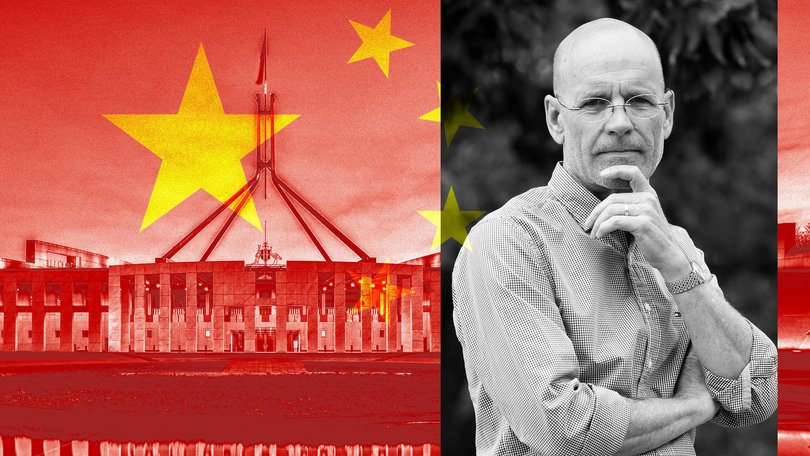Former Greens candidate who founded The Australia Institute says left-wing think tank is too soft on China
Former Greens candidate Clive Hamilton said the influential Australia Institute is too willing to overlook China’s flaws under leader Xi Jinping.

A professor and former Greens candidate said a left-wing think tank he founded more than three decades ago has become too pro-China.
Clive Hamilton, who established The Australia Institute in 1993, said the group he ran until 2008 had become a mouthpiece for the Chinese Communist Party.
The think tank often advocates policies which are adopted by the Greens, but not the Labor Party on the left of politics in Australia.
Sign up to The Nightly's newsletters.
Get the first look at the digital newspaper, curated daily stories and breaking headlines delivered to your inbox.
By continuing you agree to our Terms and Privacy Policy.“It pains me, I have to say, that The Australia Institute churns out a lot of stuff that is essentially apologetic for the CCP regime,” he told The Nightly.
Professor Hamilton, who ran as a federal Greens by-election candidate in 2009, said The Australia Institute had become so obsessed with the United States that it downplayed China’s authoritarian impulses.
“I think it’s just adopted standard, leftist tropes about the United States is the big beast that has to be opposed and that China, yes, it has certain problems but it’s a bulwark against the US,” he said.
“’After all, they lifted 600 million people out of poverty’, usual kind of propaganda. ‘Yes, they are the world’s biggest greenhouse gas polluter by far – over 30 per cent of global emissions but they’ve got a big renewables energy industry so we’ll kind of forgive them for being the world’s biggest polluter by far’.
“This kind of logic that allows people to ignore the infractions and violations of regimes that they want to see, as if not the good guys, certainly not the bad guys.”
A spokesman for The Australia Institute denied it was pro-China.
“At The Australia Institute, we often say we barrack for ideas, not political parties. To be clear, we don’t barrack for nations either,” he told The Nightly.
“As a research organisation, we believe that our democracy is improved when people have access to a broad range of information and analysis, and that applies to understanding Australia’s foreign policy and our place in the world.”
Ahead of the last election in May, the Canberra-based think tank accused the Liberal Party of “redbaiting and dog-whistling from Cold War-era electioneering” after Senator Jane Hume suggested the Hubei Association, an organisation linked with China, had been campaigning for Labor with “Chinese spies handing out” how to vote cards.
The Australia Institute in July released a poll suggesting more Australians considered US President Donald Trump a threat to world peace than either Chinese leader Xi Jinping or Russian counterpart Vladimir Putin.
It has been a regular critic of the AUKUS submarine pact with the US and the UK to counter a more assertive China and in May suggested worries about China invading Taiwan were overstated because its “opportunities were limited”.
The Australia Institute in June described American bombing targeting Iranian nuclear facilities as an “illegal American military intervention” and five years ago suggested Australia approached its relationship with China “as a US franchise”.
Greens ‘naive’
Professor Hamilton, the author of Silent Invasion: China’s Influence In Australia, also criticised the Greens for downplaying China’s military and cybersecurity threats to Australia. He recently quit the party after being a member for 14 years.
“Nowadays, they just give them a free pass. Opposition to any build-up of Australia’s defence, to protect the country from potential hostile acts, to me just represents dangerous naivete and unwillingness to recognise a threat that’s within our faces,” he said.
The academic, who lectures on public ethics at Charles Sturt University in Canberra, likened the Greens’ recent positions on China to those on the left of politics being reticent to criticise Soviet Russian dictator Joseph Stalin until his death in 1953.
“It often reminds me of the way in which members of the left in Europe apologise for or ignored the crimes of Stalinism. We’re seeing something similar nowadays,” he said.
Senator David Shoebridge, the foreign affairs spokesperson for the Greens, said Professor Hamilton was too obsessed with the past.
“Clive Hamilton may want to keep talking about Joseph Stalin but most of the rest of the planet has moved on given he has been dead for more than 70 years,” he told The Nightly.
“Australia needs a genuinely independent foreign and defence policy that allows us to deal with all nations in our region, including China, in our national interest and consistent with our values.”
Former Greens leader Bob Brown, a vocal supporter of Tibet, in October 2003 was prevented from entering the House of Representatives chamber when then Chinese president Hu Jintao addressed a joint sitting of Australian lawmakers in Canberra.
Since then, its former leaders have been less critical of China.
Former Greens MP Adam Bandt in 2020 opposed plans to spend more on defence to counter China, but that year he criticised the Chinese Government’s national security laws overriding Hong Kong’s legislature, without mentioning President Xi by name.
Larissa Waters, who took over as Greens leader after the last election, gave a parliamentary speech in 2020 condemning China’s human rights abuses and detaining of journalists during the COVID pandemic.
“The world’s focus is understandably diverted but human rights abuses continue to occur in China on a massive scale,” she said.
As leader, Senator Waters has been a much more vocal critic of Israel, regularly accusing it of violating international law.

